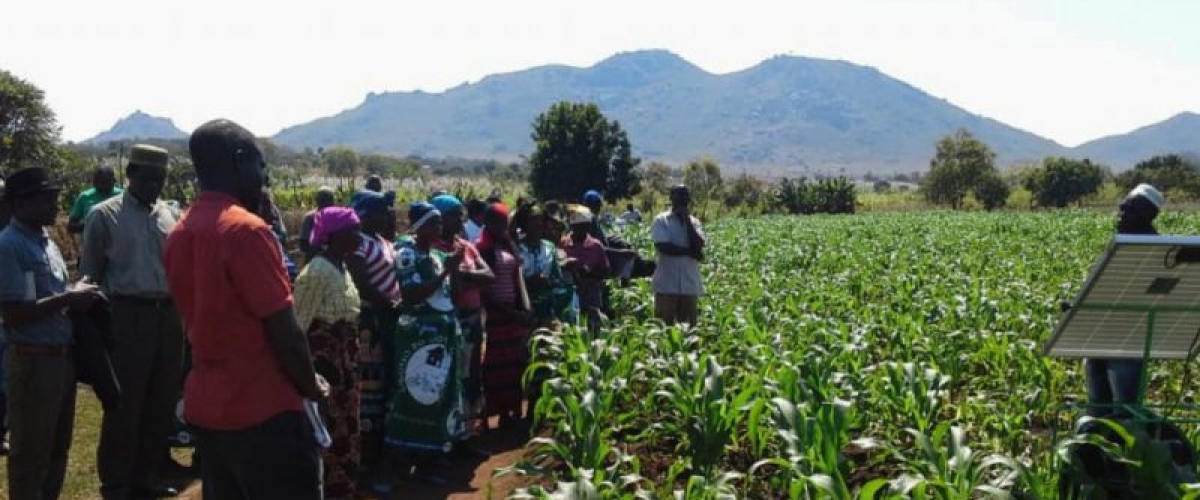
By Madalitso Kateta
Malawi like many African countries has been affected by effects of climate change, the development means suffering to 84 per cent of the county’s rural population which depends on subsistence rain-fed agriculture. Amid the changing climate patterns, agricultural research is helping farmers to adapt to new climate-resilient agricultural technologies.
Jayne Salimu from Mwingitsa village in Neno district, southern Malawi, is a classic example of farmers that are managing to harvest enough food amid changing climate patterns. A widowed mother of four, Salimu has over the recent past witnessed how unreliable rainfall patterns, either too heavy or none at all, have affected her crop yield. As climate change continues to show its impacts, Salimu has observed that poor subsistence farmers who depend on subsistence rain-fed agriculture have been facing challenges to harvest enough crop to see them through to the next harvest season. But this has no longer been the case since she started using Climate Smart Agriculture practices. “The country’s population is steadily increasing and as the population grows, there has been unsustainable use of natural resources and this has put a strain on the environment. As a result, we have been experiencing the bad weather which has affected agricultural production,” says Salimu.
According to statistics, Malawi has experienced more climate change-induced events in the period between 2000 and 2016 as compared to the period between 1970 and 2000, and incidentally, the number of food-insecure people has been steadily rising with the Malawi Vulnerability Assessment Committee (MVAC) estimating that a total of 6.7 million people were affected by a severe drought that was partly caused by El Nino in 2016 and 2017. Being an agricultural-based economy with 84 per cent of its population dependent on subsistence rain-fed agriculture according to World Bank data, the climate variations mean that the country’s subsistence farmers are pushed at the frontline of global warming. And as the future prospects of subsistence rain-fed agriculture are threatened by extreme changes in climate patterns, the Centre for Coordination of Agricultural Research and Development (CCARDESA) a regional body which was established by the Southern Africa Development Community (SADC) member countries to harmonise the implementation of agricultural research and development has brought significant change in farmer’s understanding of climate change. While increased understanding of the impacts of climate change on agricultural production is a way to go in building climate-resilient farming communities, CCARDESA has created a knowledge transfer platform which has assisted farmers to adapt to new agricultural technologies.
Through a six-year K67.2 billion (US$90 million) World Bank-supported Agricultural Productivity Program for Southern Africa (APPSA) project, CCARDESA has made available to farmers agricultural technologies that have enabled the farmers to harvest enough yield amid the harsh climatic conditions. Implemented in Malawi, Mozambique and Zambia, the APPSA project has also created a platform of knowledge transfer of climate-smart agricultural technologies and practices between agricultural experts and farmers. Hector Malaidza focal contact person for the APPSA project in Malawi told The Atlas through the project, CCARDESA has facilitated the promotion and release of improved agricultural technologies, and it has also promoted existing technologies that were already in use. Malaidza said apart from releasing a total of 367 technologies with 66 technologies developed under the project, the APPSA project has also promoted a regional approach to agricultural technology generation and dissemination. He said the project has created climate-resilient communities by creating a knowledge transfer hub which has assisted in the promotion and dissemination of new agricultural technologies. “The project has initiated the development of information communication and knowledge management hub in southern Africa where agricultural experts regularly meet to share experiences as well as developments in agricultural research and development,” said Malaidza.
Among some of the achievements, Malaidza said CCARDESA through the APPSA project reached out to 2,760,553 beneficiaries a 197 per cent increase from the 1,404,000 beneficiaries that were targeted at the inception of the project. Of these beneficiaries, Malaidza said 1,352,670 (49 per cent) were women. He said apart from assisting to train new agricultural researchers and equip agricultural scientists with new skills CCARDESA has through the APPSA project also facilitated the creation of an information and knowledge management hub where there is an easy flow of information on different agricultural trends from the countries where the organisation has programmes."The APSA project managed to reach out to many farmers with new agricultural technologies, it was, in fact, the first project to be rated satisfactory by the World Bank," said Malaidza. He said in Malawi, the project has also assisted in improving performance management systems by facilitating the review of the National Seed Policy and Strategy which was approved by the Office of the President and Cabinet (OPC) in 2018. While in most instances climate change threatens the livelihoods of vulnerable communities that rely on natural resources for their existence and wellbeing, APPSA has empowered the subsistence farmers with the right climate information and these farmers are now using climate-smart agricultural practices.
Lucky Chimbereko of Mzerembe village in Traditional Authority Mazengera in Lilongwe said his crop yields have improved since when he started practising climate-smart agricultural practices.“We used to have challenges accessing to inputs such fertiliser, but since when I started practising climate-smart agricultural practices I am able to have enough crop yield even without the use of chemical fertilizers as these practices encourage environmental conservation,” said Chimbereko.
Meanwhile, as the agricultural researchers continue to release the new climate-smart agricultural technologies, farmers like Jayne that were suffering from persistent climatic shocks are finally getting a sigh of relief as they now have enough food to last them to the next growing season. This relief is however incomplete when CCARDESA is pulled out of the picture.
The author is a Freelance journalist writing news for international media houses including Equal Times, CBD-INTEL Climate home news among others.






